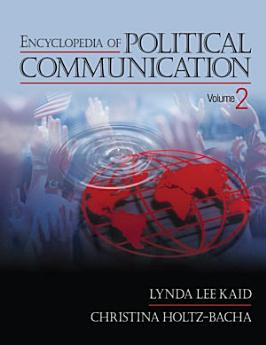Encyclopedia of Political Communication
À propos de cet e-book
2008 Best Reference, Library Journal
Political communication began with the earliest studies of democratic discourse by Aristotle and Plato. However, modern political communication relies on an interdisciplinary base, which draws on concepts from communication, political science, journalism, sociology, psychology, history, rhetoric, and others. This two-volume resource considers political communication from a broad interdisciplinary perspective, encompassing the many different roles that communication plays in political processes in the United States and around the world.
The Encyclopedia of Political Communication discusses the major theoretical approaches to the field, including direct and limited effects theories, agenda-setting theories, sociological theories, framing and priming theories, and other past and present conceptualizations. With nearly 600 entries, this resource pays considerable attention to important political messages such as political speeches, televised political advertising, political posters and print advertising, televised political debates, and Internet sites. The audiences for political communications are also central, necessitating concentration on citizen reactions to political messages, how the general public and voters in democratic systems respond to political messages, and the effects of all types of media and message types.
Key Features
- Encompasses several channels of political communication including interpersonal and public communication, radio, television, newspapers, and the World Wide Web
- Provides news media coverage and journalistic analysis of politics, political issues, political figures, and political institutions
- Concentrates on the field of political communication since the middle of the 20th century
- Emphasizes political communication from the point of view of the United States, but there is substantial and important research and scholarship on political communication in international contexts
- Considers the role of communication in governing, incorporating communication activities that influence the operation of executive, legislative, and judicial bodies, political parties, interest groups, political action committees, and other participants in political processes
- Biographies
- Books, Films, Journals, Television
- Democracy, Democratization
- Education and Nonprofit Organizations
- Elections
- Government Operations and Institutions
- Legal and Regulatory
- Media Events
- Media Outlets and Programs
- Role of Media in Political Systems
- News Media Coverage of Politics, Political Affairs
- Theoretical Approaches
- Types of Political Media
- Political Attitudes
- Political Campaigns
- Political Events
- Political Groups and Organizations
- Political Issues
- Political Journalism
- Theoretical Concepts
- Women in Politics
The Encyclopedia of Political Communication is designed for libraries, undergraduates, and members of the public with an interest in political affairs. Media and political professionals, as well as government officials, lobbyists, and participants in independent political organizations, will find these volumes useful in developing a better understanding of how the media and communication function in political settings.
Notes et avis
À propos de l'auteur
Lynda Lee Kaid (Ph.D., M.S., B.A., Southern Illinois University) is Professor of Telecommunications and Senior Associate Dean of the College of Journalism and Communications at the University of Florida. She previously served as the Director of the Political Communication Center and supervised the Political Commercial Archive at the University of Oklahoma. Her research specialties include political advertising and news coverage of political events. A Fulbright Scholar, she has also done work on political television in several Western European countries. She is the author/editor of 14 books, including the Handbook of Political Communication Research, Videostyle in Presidential Campaigns, The Electronic Election, New Perspectives on Political Advertising, Mediated Politics in Two Cultures, Political Advertising in Western Democracies (SAGE, 1995), and Political Campaign Communication: A Bibliography and Guide to the Literature. She has received over $1 million in external grant funds for her research efforts, including support from the U. S. Department of Commerce, the U.S. Department of Education, the National Endowment for the Humanities, and the National Science Foundation. She is a former chair of the Political Communication Divisions of ICA and NCA and has also served in leadership roles the American Political Science Association and the Association for Education in Journalism and Mass Communication.
Christina Holtz-Bacha (Ph.D.) is the current chair of ICA’s Political Communication Division. In addition to her position at the University of Mainz (where she has taught since 1995), she has held positions at the University of Munich, the University of Bochum, the University of Minnesota—Minneapolis, and was a Fellow at the Shorenstein Center/John F. Kennedy School of Government at Harvard University in 1999. She is co-editor of the German journal Publizistik and sits on the editorial boards of Journal of Communication, Journal of Political Marketing; and European Journal of Communication.She is co-editor with Lynda Lee Kaid of Political Advertising in Western Democracies (SAGE, 1995).






